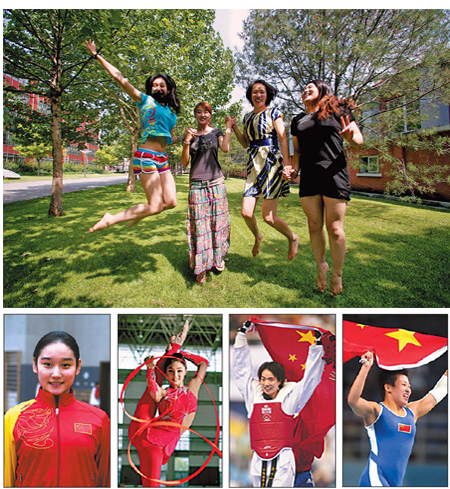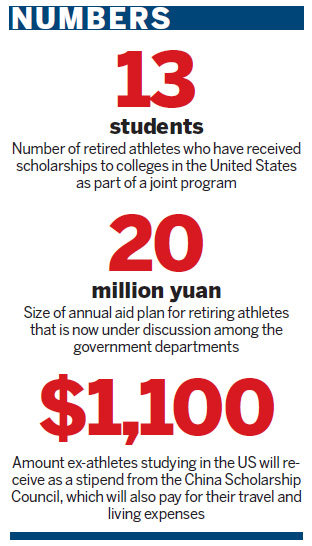Focus
Helping athletes after the finish line
By Hu Yongqi and Sun Xiaochen (China Daily)
Updated: 2010-08-10 12:03
 |
Large Medium Small |
An overseas study program aims to boost sports stars' career prospects after retirement. Hu Yongqi and Sun Xiaochen report in Beijing.

Before and after competition. From the left: Zhu Dan, a silver medalist in women's rhythmic gymnastics at the 2008 Beijing Games; Chou Tao, a former champion gymnast; Chen Zhong, women's taekwondo gold medalist at both the 2000 and 2004 Olympics, and Wang Xu, gold medalist in the women's 72-kg freestyle wrestling at the 2004 Athens Games. Yang Shen / for China Daily |
Few stars can rise and fall as quickly as Chinese athletes. One moment they are heroes being cheered on by hordes of adoring fans, the next they can be forgotten has-beens struggling to earn a living.
Yet, the traditional culture of sportsmen and women being trained in body and not in mind is rapidly changing, with education now a top priority.
Beyond projects being run by some of the country's best universities to help up-and-comers, 13 retired champions - most of whom are still in their 20s - have now received scholarships to colleges in the United States and Britain.
The program, which is jointly sponsored by the Chinese government and foreign universities, is aimed at giving elite sportsmen and women a chance to nurture challenging and fruitful post-athletic careers, officials at Beijing Sports University said.
Four of the athletes will leave for Indiana University this month, while nine others began their studies at the University of Wisconsin-Madison in July.
Only world champions and Olympic medalists are eligible for the program and among the best known in the group are Chen Zhong, 27, who won gold in the women's taekwondo at both the 2000 and 2004 Olympics, and 24-year-old Wang Xu, gold medalist in the women's 72-kg freestyle wrestling at the 2004 Athens Games.
"This is a big step in providing further education and livelihood guarantees for the nation's elite athletes, who have been under the spotlight for their brilliant performances in competition," said Chi Jian, vice-president of Beijing Sports University and heads of the study program for former athletes.
Beijing Sports University and the University of Wisconsin-Madison jointly launched the initiative in March after several high-level exchanges between the two in 2008.
In addition to the foreign colleges waiving tuition fees, the China Scholarship Council also agreed to fund living expenses and travel costs for a total of 20 retired athletes studying abroad, including Li Na, the Olympic diving gold medalist, who in July joined an eight-month project at Britain's Leeds University. Former Chinese athletes studying in the US will also receive a monthly stipend of $1,100 from the council.
It is the first time in China's history so many former athletes have been sent to study abroad, said Chi.
"I believe our efforts will provide long-term guarantees for their career development after retirement," he said, "Although, since this is our first attempt at doing this, it is hard to say what effect it will have in the end."
The six-month non-degree course for the athletes at the University of Wisconsin-Madison will include courses in English, kinesiology and sports management.
However, with limited education backgrounds, some of the retired sports stars admit they could face difficulties abroad.
"The language may be the biggest obstacle for us, even though we've already had intensive English training for three months," Wang Bingyu, captain of the women's national curling team, said during her farewell party in Beijing on July 21. "There's still much more for us to catch up with."
As the only athlete in the Wisconsin group who still competes, the 26-year-old knows there will be extra pressure on her to maintain her rigorous training program while she studies.
"Despite the various difficulties, I'll try my best to find a balance," said Wang, who led her team to bronze at the 2010 Winter Olympics in Canada, as well as victory at the 2009 World Women's Curling Championships in South Korea.
"With the help of the professors, I may have the chance to train with local curling teams. I'm eager to learn from the confidence and aggressiveness of American players," she said.
Zhu Dan, a retired silver medalist in women's rhythmic gymnastics at the Beijing Games, who will attend the training course at the University of Wisconsin-Madison, said she is looking forward to studying advanced concepts in training and sports management. "I'm just afraid most of my time will be spent learning English, though," she added.
Critics suggest that, as most of the athletes are far from fluent in English, the effects of the program will ultimately be minimal, while some netizens have branded the joint project "just a show".
However, program leaders at the University of Wisconsin-Madison insist there is a genuine desire to help China's former athletes achieve their post-career goals.
"It's definitely a precious chance," said professor Ji Li Li, head of the college's department of kinesiology, who originally suggested the program to officials at Beijing Sports University two years ago.
Ji, the first Chinese scholar appointed director of a sports department at a US university, said the college will provide the Chinese students with tailor-made courses to suit his or her personal profile and English skills.
They may also get the chance to meet professional American athletes and learn how local sports clubs operate, he added.

Winners to losers
"About half of (all retired athletes) have no way of finding a job that makes good money because they are not well educated and no mechanism exists to ensure their rights," Liu Guangtao, director of personnel for the administration, told Nanjing Daily.
Liu Fei, a world champion gymnast in 1998, is a prime example of the struggle faced by former stars. She retired from the Liaoning provincial training camp in 2000.
"I had nothing and the only people I could rely on were my parents," said the 31-year-old. "My parents and I didn't expect any respect, just a peaceful and relatively well-to-do life."
However, two years after enrolling at Liaoning College of Sports in 2001, Liu's father died following a traffic accident, leaving the family with medical bills topping 200,000 yuan ($29,500). Despite the setback, she eventually graduated in 2005 and was hired as a coach at the Benxi Municipal Sports Training Camp.
"I overcome the difficulties with exertion and honesty," Liu Fei said with pride, explaining that many former gymnasts fail to forge successful careers post-competition.
No further training is offered to retiring athletes at the Liaoning training camps that produce thousands of champions, she said, blaming the problem on a shortage of funds and awareness by sports authorities.
The General Administration of Sport has run more than 10 training programs annually to help retired athletes since 2007, the year it issued a regulation stating retired athletes should be paid subsidies while they search for jobs after retirement. A 38-million-yuan government program that ran from 1995 until early 2006 also helped 9,101 athletes and coaches, show official statistics.
Former stars may soon benefit from an annual aid plan of about 20 million yuan too, according to plans being discussed by sports administration.
Falling from grace
With their formative years devoted almost entirely to winning honors for their country, most of China's world-class athletes face a harsh life after retirement.
In 2005, Chinese media reported that Ai Dongmei, a gold medalist at the Beijing International Marathon Contest in 1999, sold her medals to feed her family, while this year, Sang Xue, a synchronized diving champion at the 2000 Sydney Games in 2000, competed in television game shows to earn money to "cure her mother".
Chen Ying, a former world marathon champion, was killed in 1998 in an accident at a coal mine, where she had been working as a security guard, one of the few jobs she was qualified for.
Friends said Chen had attempted to get a job as a newspaper reporter but was turned down due to her poor education background.
The employment of retired athletes is a complicated issue and needs to be resolved by several government departments, said Liu Guangtao at the State sports administration, who suggested a strong network of unions and associations to help guide ex-sportsmen and women towards jobs.
"The (foreign university) program makes it easier for retired athletes to find a job or a coaching position," said Xiao Hongbo, a professor of journalism at Shanghai University of Sports. "More programs should be conducted to help more athletes facing retirement."
The lack of a well-rounded education for most athletes is a disadvantage, he said.
Liu Guangtao agreed and told Nanjing Daily: "Many training teams and coaches think athletes should dedicate themselves solely to their sport and are reluctant to give them time for study."
Poor educational backgrounds also worsen their situation. Zhou Lu, a teenage national swimming champion, was admitted to a university after retirement but could not catch up with her classmates. She ended up working as a saleswoman in a supermarket after graduation.
Xiao said the sports industry in China has a deep-rooted problem in that sports authorities continue to make almost all the decisions over professional athletes, leaving the public's voice unheard.
"We have strived for years to weaken the sole voice of the sports authorities but it is even stronger today than before," said the professor. "As long as this is the case, the situation for athletes will not improve and they will rarely have a chance to lead better lives after retirement."
A movement is now under way to raise the public's awareness of sports and athletes' struggles, said Xiao, who argued that public and private enterprises, as well as ordinary citizens, should help choose athletes for competition.
A pyramid structure exists among Chinese athletes, as it has for decades, meaning the few gold medalists are at the top and thousands of lower-level athletes are at the bottom, he explained.
"These lower-level athletes especially suffer harsh times after retirement," said Xiao. "Many athletes were born in poor families and they will totally depend on a sport when playing for a professional team. They train so hard but unfortunately just one person gets first place.
"There are too many stories of champions selling their medals for bread and medicine. They deserve better than that," he said.
Liu Ce in Shenyang contributed to this story.